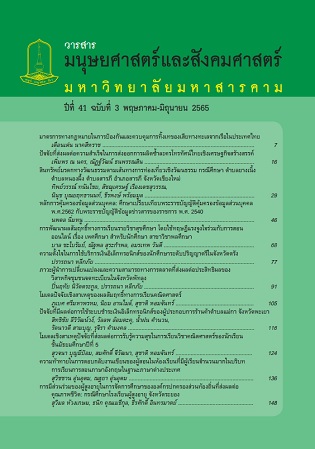การพัฒนาโมเดลเชิงสาเหตุปัจจัยที่ส่งผลต่อการรับรู้ความสุขในการเรียนวิชาคณิตศาสตร์ของนักเรียนชั้นมัธยมศึกษาปีที่ 5
Main Article Content
บทคัดย่อ
การวิจัยครั้งนี้มีจุดมุ่งหมายเพื่อศึกษาความสัมพันธ์ระหว่างปัจจัยที่เป็นสาเหตุต่อการรับรู้ความสุขในการเรียนวิชาคณิตศาสตร์ พัฒนาและตรวจสอบความสอดคล้องของโมเดลเชิงสาเหตุปัจจัยที่มีผลต่อการรับรู้ความสุขในการเรียนวิชาคณิตศาสตร์กับข้อมูลเชิงประจักษ์และศึกษาขนาดอิทธิพลทางตรงและทางอ้อมของตัวแปรในโมเดลเชิงสาเหตุปัจจัยที่มีผลต่อการรับรู้ความสุขในการเรียนวิชาคณิตศาสตร์ของนักเรียนชั้นมัธยมศึกษาปีที่ 5 สำนักงานเขตพื้นที่การศึกษามัธยมศึกษา เขต 32 ตัวอย่างในการวิจัย คือ นักเรียนชั้นมัธยมศึกษาปีที่ 5 จำนวน 830 คน เครื่องมือที่ใช้ในการวิจัยเป็นแบบวัดประกอบด้วย 7 ตอน จำนวน 114 ข้อ การวิเคราะห์ข้อมูลโดยการวิเคราะห์สหสัมพันธ์อย่างง่าย และการวิเคราะห์ข้อมูลโดยใช้สถิติอ้างอิงเพื่อทดสอบสมการเชิงเส้น ผลการวิจัยพบว่า
- 1. ปัจจัยที่มีความสัมพันธ์ต่อการรับรู้ความสุขในการเรียนคณิตศาสตร์ของนักเรียน คือ คุณลักษณะของครูผู้สอน การจัดการเรียนการสอน คุณลักษณะภายในตนเอง การได้รับการยอมรับ คุณลักษณะของบิดามารดา / ผู้ปกครอง และคุณลักษณะของเพื่อนร่วมชั้นเรียน
- 2. โมเดลมีความสอดคล้องกลมกลืนกับข้อมูลเชิงประจักษ์ โดยพิจารณาจากค่าดัชนีวัดระดับความกลมกลืนอยู่ในเกณฑ์ที่กำหนดทุกค่า คือ
- 3. ปัจจัยที่มีอิทธิพลทางตรงต่อการรับรู้ความสุขในการเรียนวิชาคณิตศาสตร์ คือ คุณลักษณะภายในตนเอง การจัดการเรียนการสอน และคุณลักษณะของเพื่อนร่วมชั้นเรียน ปัจจัยที่มีอิทธิผลทางอ้อมต่อการรับรู้ความสุข คือ คุณลักษณะของครูผู้สอนและคุณลักษณะของบิดามารดา / ผู้ปกครอง
ABSTRACT
This research aims to find the correlation among factor variables with the perception of happiness in mathematics learning in order to develop and validate the accordance of causal factor model affecting the happiness of mathematics learning with the empirical data and to study the size of the influence of direct and indirect variables in casual factor model that affects the happiness perception in mathematics learning of Mathayomsuksa 5 students under Secondary Education Service Area Office 32. The samples of 830 students from Mathayomsuksa 5 were randomized using Multi - Stage Random Sample method. The tool used was a happiness perception scale, which divided into 5 parts containing 114 inquiries. Data analysis was done by using simple correlation analysis and data analysis using reference statistics for linear equation testing. The research results revealed that:
- Factors that related to the happiness perception of Mathematics learning were teacher’s attributes, instructional management, self -traits, feeling of being accepted, parents/ custodians’ attributes and classmates’ attributes.
- Being developed, the causal factor model affecting the happiness perception in Mathematics , corelated with empirical data in which all statistics used passed all criteria with statistic shown as follows;
- The direct influencing factors on the happiness perception were self – traits, instructional management and classmates’ attributes. The happiness perception of mathematics learning was indirectly influenced by teachers’ attributes and parents / custodians’ attributes.


